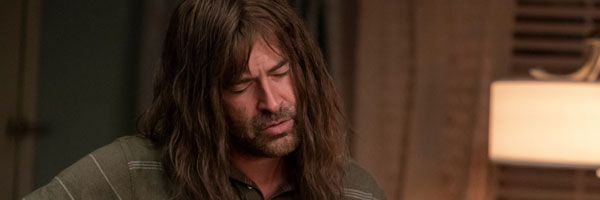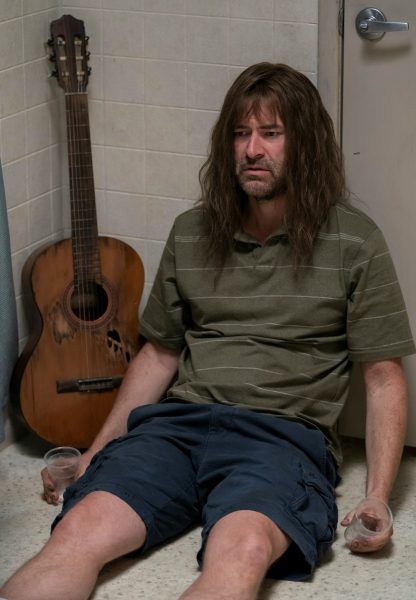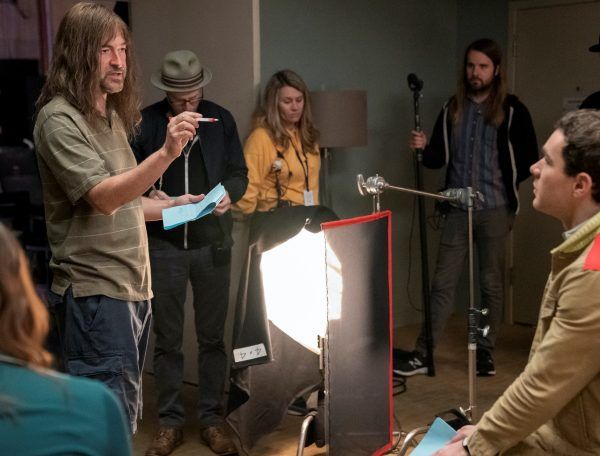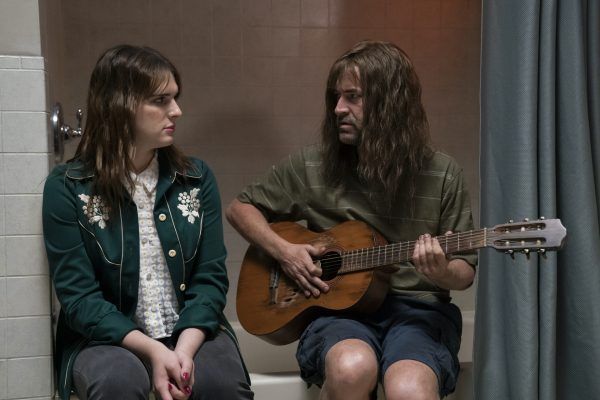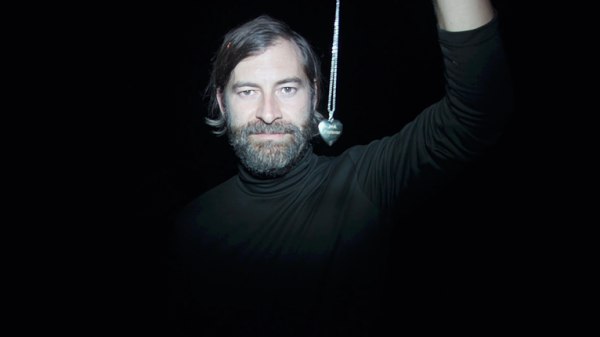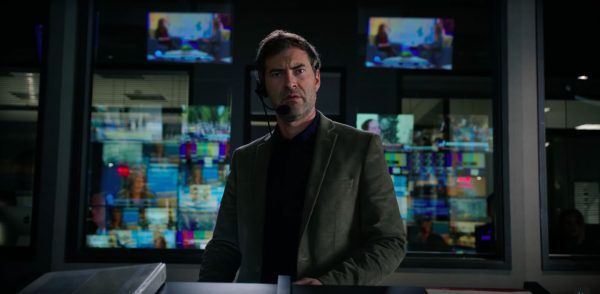Created by Mark and Jay Duplass, the HBO half-hour anthology series Room 104 returns for its fourth and final season with 12 new episodes that explore different genres, characters, tones, plots and time periods. Set in the same room of a typical American chain motel, the characters and the director change from episode to episode (although there are some repeat filmmakers), and the story being told can be anything from dark comedy to sci-fi to sitcom to animation. Sometimes there's blood, sometimes there are tears, sometimes there are original songs, and sometimes there's even a bit of dancing.
During this 1-on-1 phone interview with Collider, executive producer/writer Mark Duplass, who also directed, stars and sings in the episode of Season 4 entitled “The Murderer,” talked about how he feels about the collection of episodes they’ve put together over four seasons of Room 104, why he chose to direct this specific episode of the show, his hope that, even though this is the last season, the show will still come back in some form, and his decision to do a 16-hour tweet-a-thon on July 24th: During the “Open The Door to @MarkDuplass’ Mind” event, he’ll watch the 36 episodes that lead up to the latest season.
Duplass also talked about why there still isn’t a Creep 3, his advice for how low-budget filmmakers can stay creative during quarantine, and what he’s looking forward to with Season 2 of the Apple TV+ series The Morning Show.
Collider: I find this TV series so fascinating because you never really quite know what to expect with each episode, from the cast to the genre.
MARK DUPLASS: Well, then, you’re my perfect viewer. That’s something that a lot of people don’t like about the show, and that’s what it’s designed for it, so I’m glad you’re there.
When I spoke to you for the first season of Room 104, I had asked if you knew exactly what you wanted to get out of the show, when you had started doing it, and you said that you didn’t totally know because you were chasing something that you hoped would be good, but weren’t sure you could make good. Now that you’re here, having done four seasons and with this being the last season, how do you feel about the collection of episodes that you’ve done, over the seasons?
DUPLASS: Well, that is a lovely and thoughtful question, so thank you. I feel like I found out what this show was meant to do, as we started writing Seasons 2 and 3, which we did in a group together. It’s a larger question of, where I’m at in my career, where I’m at in my life, and what I think the world needs in the glut of content. It’s this whole question we have of, if you’re going make something, please make it count, because there’s too much shit out there to watch, anyway. Everyone’s got 400 TV shows on their queue.
And the answer for me, which I did not come up with, but presented itself to me after Season 1, was, “If I continue to author episodes, whether I write them myself or direct them, the show is going to get boring and I’m going to repeat myself.” And so, I started collaborating, deeply, with other people. This also coincided, at a time in my life, where my brother (Jay Duplass) and I were starting to realize that we had been in a co-dependent creative collaboration for 30 years and we were consciously uncoupling from that. That was painful, but important.
And so, what happened with Room 104 was that I started deeply collaborating with people, some of whom were strangers, and offering them the chance to tell the kind of story that they want to tell in the room. I realized it was an incredible opportunity to give character actors who never had their leading role before, a chance to shine. It gave the opportunity at a time, three years ago, where there were very few female persons of color directing, and we could give them their first big directing credit on a show on HBO, and then they could go off and have a huge career from there. And what I would get in return was tremendous enthusiasm. They would work way harder than I would, at this stage in my career, because I want to stay home and play with my kids as much as I can, and I would get fresh stories for the room and a perspective that we didn’t have before.
So, it ended up becoming this incredibly collaborative playground, where people could come for new opportunities and I could be less of a creator, and the voice and the vision of the show, but more of the uncle who had a platform and a support system in place to fill in whatever gaps they didn’t have, when they were on their first big journey, be that in front of or behind the camera. It was so spiritually fulfilling, in addition to just making it a more interesting show.
Of the episodes that you wrote this season, why did you want to direct “The Murderer,” specifically?
DUPLASS: In all fairness, me directing that episode, that’s a very loose title. Since I was acting, and I wrote it, and was directing and playing music, I basically told all of my core collaborators – Julian Wass, Syd Fleischmann, Mel Eslyn, and our cinematographer, Sean McElwee – “I’m going to lose my objectivity in the first three minutes of this, and I need you guys with me, please, in video village, to help me make this as good as we can.” So, technically, I had the director credit, but it was much more of an arts and crafts project with a bunch of people who really like each other, trying to make something strange. That’s part of the reason why I decided to do it. And I guess, if I’m being totally honest, at the end of the day, we do a lot of episodes that are two days or three days to shoot, and it’s very little time. This was an episode that I felt comfortable directing in two days, but I didn’t really want to ask someone else to have to do it in two days. That’s a little bit of a Herculean task.
This episode features a lot of original music — how was it to sing so many songs for the episode and to tell so much of the story with those songs?
DUPLASS: It was really fun. Like everything else with a show, you don’t know how well it’s going to work, until you try it. I guess why this show has worked for me, for so long, is that it’s okay if you make an episode that isn’t perfect, but at least it’s weird and inspired. That’s how I feel about the show, in general. So, while I was doing it, I was thinking, “Oh, this is great. It’s an expositional tool that I’ve never even thought of using before. And if I pace it correctly, in between the songs, the songs themselves might feel like little mini chapter breaks that help pace the narrative or break it up.” So, I was as much learning about it while I was doing it, as I was employing it with any sort of precision.
There’s such an interesting dynamic between your character and Hari Nef’s character. What do you think she brought to that role and added to your performance?
DUPLASS: I know Hari because she’s a supporter of libraries, like I am, and we work in this non-profit initiative. Do you ever just meet someone and recognize something in them that is similar to you? She and I recognized the darkness in each other, immediately, when we met, and I tried to just use that essential connection in there. In a room full of sycophantic vampiric fanboys who only want to worship him, so that they can literally suck his emotional blood to make themselves feel better, she is a person who realizes how strange that is and how to create music like that involves so much pain that the boys are completely unaware of and sensitive to. And so, that nature of their connection is a similar connection that Hari and I would have, while we’re talking at a cocktail party to raise funds for a public library. We have a similar hard time doing small talk, and end up getting into more true and real things. I was like, “I know we’ll have this dynamic because it’s something that I’ve already seen us do together.”
You’re going to be doing a tweet-a-thon on July 24th, called “Open The Door to @MarkDuplass’ Mind.”
DUPLASS: Yeah, god help me.
I can’t imagine what it will be like to watch three seasons and 36 episodes for 16 hours. That seems like a lot to take on. Have you watched any of the episodes, since completing each season, or is this going to be the first time that you’re watching them all again?
DUPLASS: I have never voluntarily gone to HBO Go or HBO Now and watched an episode of Room 104. Once I’m done making them, they’re up and they’re gone. That’s pretty much true for all of my movies, and not specific to this show. So, I’m super excited, honestly, to have a marathon where I just sit and watch them, and get to enjoy them. I’m a little nervous about what’s going to happen to my eyes, over the course of that. I’ve gotta be honest with you, I’m probably going to take a weed gummy or two, to help get me through it. I don’t know, man. I signed on to do this thing, which sounded like fun, and now I’m coming up on it and I’m like, “What have you done? This is ridiculous!” It’s part and parcel with who I am. I come up with these ideas and, for better or for worse, I’m in a position in my life where people are there to help me execute them, and so they become a reality. I might regret this one.
What do you think the experience will be like? Do you think it’ll provide you with insight that you didn’t have, when you watched these episodes, back when they were done?
DUPLASS: Yes, I think that’s what’s going to happen. I think I’m going to watch this and it’s going to be like therapy and I’m going to learn something about myself. I’ve authored, from a writing standpoint only, almost half of these episodes. Sean McElwee, who is one of our DPs on the show, always makes a joke, when we start a new season of Room 104 and says, “Well, let’s see what Mark is dealing with in therapy this year.” And I think that there’ll be an element of that.
When are we going to get a Creep 3?
DUPLASS: I am still honored and surprised at how much Creep and, in particular, Creep 2 have connected with people. I was very nervous to make a sequel to that movie. I don’t wanna say we got lucky because we worked our asses off, trying to make Creep work. We shot and re-shot, over the course of a year and a half, to make that movie work. Creep is a movie that shouldn’t work, and it did. And then, we tried again with Creep 2, and a sequel to a movie that shouldn’t work, definitely shouldn’t work, and it did work for people. So, the reason there is no Creep 3, or that there is no Creep 3 yet, I should say, is that we don’t have an idea that’s good enough. We’ve come up with two or three different ideas. We’ve gotten into script phases of them. But we have promised ourselves that we will not make a third Creep, unless it is worthy of being made and we have at least a decent shot of it being good. We’re just not there yet.
What’s the gauge for that? How do you know when you’re there, and how do you know that you’re not there?
DUPLASS: It’s an inner barometer, and that is not a barometer that is empirically true, but it can be a self-fulfilling prophecy. If you feel strongly enough and good enough about the idea, even if the idea may not be empirically good enough, your love for it will create a momentum and self-fulfill it to be good, if you’re paying attention and you’re in that zone. Part of it is that our lives have gotten really busy, and Patrick [Brice] now has two kids and his own directing career, so the bandwidth, in order to get to it and give it that time and love, is not as simple as the times when Patrick and I could abscond to a cabin in the woods, seven years ago, and see what happens. But usually it’s a gut instinct for me, that tells me whether it’s ready or not.
Do you have any advice for how low-budget filmmakers can stay creative, while everybody is stuck in life lockdown?
DUPLASS: I do. In fact, I’m actually going to be giving a seminar with Seed & Spark, which is a company that I do a lot of what are called creative sustainability summits with, where I give free, either online or in-person, seminars for people, about different elements of the micro-budget filmmaking process and what you can do to swing the sword in your hand, so you don’t have to wait for anybody’s help. I’m doing one on Friday (July 17th), and I’m going to be talking specifically about writing and making things in quarantine and in this time frame. It’s not a lot of rocket science.
The same ethic is still true of making micro-budget filmmaking when we’re not in a quarantine, which is, stop waiting and stop dreaming about the time when someone is going to empower you or give you money. The only person you have to rely on is yourself. I always say this, but the cavalry is not coming. No matter how many times you think they might be coming, no one cares about you right now. No one is waiting to give you money to do your thing. You have to show them what you have. It sucks, but it’s the truth. There is a movie, there is a short film, there is a TV show, there is a narrative podcast that can be made no matter where you are and what your situation is. That’s what you should be doing. I’ve made my whole career like that. I’ve probably passed up chances to sell things to studios that I could’ve maybe made more money on, but I’ll never regret not waiting.
Even though there was incredible talent involved, nobody really knew what The Morning Show would be when it debuted because nobody really knew what to expect from Apple TV+. Is it nice to see the reaction the show has had, and are you looking forward to getting to explore more of that?
DUPLASS: I am looking forward to it, and it’s on a number of fronts. I just love our creative team. We’ve got this dynamic foursome of female leaders, in the form of Reese [Witherspoon] and Jen [Aniston], and Mimi Leder, our producing director, and Kerry Ehrin, our showrunner, who just lead that show so gracefully and so well ‘cause they have, themselves, experienced shitty leadership, throughout the years. They have not visited the sins of their fathers upon us. They’re really fucking awesome. So, I love that. I feel very respected and taken care of. With the first season, there was a large #MeToo movement that shifted the creative course of the show, and now there’s another large movement that is shifting our creative course. [After the pandemic], they shut us down after shooting two episodes, and I know that Kerry is rewriting. I don’t know what she’s doing, but she likes to deal with the moment, as it is.
I think it’s really incredible that Reese and Jen, in particular, at this stage in their careers, are not just cashing paychecks on whatever show comes their way, without doing any of the producing work to back it up. They’re using their platforms to tell the stories that they think are important and meaningful. I hope that movie stars are watching them, and that people of power are watching them, and seeing this as a microcosm of what can be done. I know I am. I don’t have near that sphere of influence that they do, but whatever relative position of power I have, I’m trying to think about what I can do to tell impactful stories and stories that matter. And even beyond that, just be a part of moving this whole cultural conversation forward. They do a really good job of that.
Are there genres, tones or ideas, that you had always wanted to do in a film, but just hadn’t been able to, that you were able to do with Room 104. And are there any that you never got to, that you wish you’d gotten to do?
DUPLASS: I did get the chance to experiment with different tones and genres a ton, with Room 104. That’s part of why I started this show. Even though the goal and the ethic of what I wanted to do there shifted in the later seasons, it did begin as a way to say, how can I express these other sides of myself, that are not necessarily on brand with Duplass Brothers? I got to do that with things like The One I Love and Creep, as well, so that happens in the smaller budget movies I’m producing, too. There’s not necessarily a genre that I didn’t get to do, in this first 48-episode run of Room 104 ‘cause I don’t believe it’s over for good. I believe we’re going to come back, in some way, shape or form, in the future, but there are tons of episode ideas that I haven’t gotten to make. I probably have a list of over a hundred that I want to do, so I don’t feel done.
I love that you can have both a sitcom episode and an animated episode this season.
DUPLASS: And that’s a testament to HBO and their belief in us. We learned a lot. You can’t go to a place like HBO and ask for a Game of Thrones budget, and make Room 104. That doesn’t make sense, from an economic standpoint, but you can do it, if figure out a way to make it modestly and cheaply, and basically stay in that little sweet spot of a little lottery tickets show. It’s a proving ground for talent. They’ve hired people from the show to do other things. And so, we found a way to make it work that was beneficial to everybody. I’m looking to do a lot more of that with the company, and in different spaces.
Was there an episode this season that was most challenging to get done, for whatever reason?
DUPLASS: There were a lot of really challenging ones. “The Last Man” was super challenging, from a musical standpoint, and without giving away too much, from how much we shot things that technically existed outside of the traditional set that we have. And the animated episode (“Fur”) that Mel Eslyn wrote and directed, we were totally naive about how difficult that was going to be because it was a whole new workflow. And then, I think the most creatively challenging one was “Avalanche,” which stars Dave Bautista, but also a bunch of dolls. I asked Ross Partridge to direct that, and he’s such an incredibly visual director. He came up with all of these ideas that weren’t in the script, for ways to operationalize, visually, things that I wanted to happen, but didn’t know how I wanted them to look. He did the same thing for me on the “Mr. Mulvahill” episode (from Season 2), which was essentially a 23-minute play that he found a way to make visually interesting. That one was a real success point, in terms of what Ross brought, as a director, and what Dave brought, as an actor. He was just so raw and subtle and deep. To me, he is endless. He’s super sweet, super nice, really well-prepared, and every take is inspired and also different, giving you different options. That dude is my hero.
Room 104 airs on Friday nights on HBO, starting on July 24th.
Christina Radish is a Senior Reporter of Film, TV, and Theme Parks for Collider. You can follow her on Twitter @ChristinaRadish.

